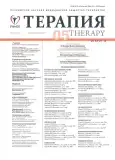Hormonal testosterone replacement therapy in young male patients with hypogonadism and erectile dysfunction after the past COVID-19
- Авторлар: Beroeva M.R.1, Mkrtumyan A.M.2,3
-
Мекемелер:
- Republican Multidisciplinary Medical Center of the Republic of South Ossetia
- Russian University of Medicine of the Ministry of Healthcare of Russia
- A.S. Loginov Moscow Clinical Research Center of the Department of Healthcare of Moscow
- Шығарылым: Том 10, № 5 (2024)
- Беттер: 79-83
- Бөлім: ORIGINAL STUDIES
- URL: https://journal-vniispk.ru/2412-4036/article/view/262351
- DOI: https://doi.org/10.18565/therapy.2024.5.79-83
- ID: 262351
Дәйексөз келтіру
Аннотация
In the modern world, negative after-effects of COVID-19 pandemic are being actively studied. New coronavirus infection aggressively affects many organs, including male reproductive system, binding to ACE 2 receptor on the surface of cells of the reproductive organs. The virus activates oxidative stress and hyperproduction of cytokines, which negatively affects testicular cells, causing hypogonadism and erectile dysfunction in young male individuals.
The aim: to estimate the possibility of hypogonadism correction and restoration of erectile function in young male patients underwent COVID-19 using a transdermal gel form of testosterone.
Material and methods. 104 male individuals aged 20–45 years were included in the study. The main group consisted of 75 patients who had COVID-19 in the past, control group – 29 healthy individuals. During the period of COVID-19 illness and after 12 weeks after the recovery, body mass index, levels of luteinizing and follicle-stimulating hormones, total testosterone were determined, and the IIEF-5 questionnaire (International Index of Erectile Function) was used for erectile function assessment.
Results. 80% of male patients had a reduced total testosterone level (p < 0.01) during the period of COVID-19 disease. According to the results of the IIEF-5 questionnaire, in the main group with COVID-19, erectile dysfunction was detected in 81% of cases (p < 0.01). In 12 weeks after the recovery, 64% of the surveyed males had low levels of total testosterone (p < 0.01); according to the results of the IIEF-5 questionnaire, sexual disorders persisted in 44% (p < 0.01). During 12 weeks of transdermal gel testosterone replacement therapy, all examined male patients experienced a significant increase in testosterone levels (p < 0.01) and 100% satisfaction with erectile function (p < 0.01).
Conclusion. Testosterone replacement therapy improves total testosterone and sexual function in young male patients with hypogonadism arised after the past COVID-19.
Негізгі сөздер
Толық мәтін
##article.viewOnOriginalSite##Авторлар туралы
Monika Beroeva
Republican Multidisciplinary Medical Center of the Republic of South Ossetia
Хат алмасуға жауапты Автор.
Email: monicaberoeva@yandex.ru
ORCID iD: 0009-0002-8563-7838
MD, endocrinologist at the Republican Multidisciplinary Medical Center of the Republic of South Ossetia, applicant for the academic degree of PhD (Medicine) at the Department of endocrinology and diabetology of the Russian University of Medicine of the Ministry of Healthcare of Russia
Ресей, 100001, Tskhinval, 78 Osetinskaya St.Ashot Mkrtumyan
Russian University of Medicine of the Ministry of Healthcare of Russia; A.S. Loginov Moscow Clinical Research Center of the Department of Healthcare of Moscow
Email: vagrashot@mail.ru
ORCID iD: 0000-0003-1316-5245
MD, Dr. Sci. (Medicine), professor, head of the Department of endocrinology and diabetology, head of the Scientific Department of endocrine and metabolic disorders
Ресей, 127006, Moscow, 4 Dolgorukovskaya St.; 111123, MoscowӘдебиет тізімі
- Dutta S., Sengupta P. SARS-CoV-2 and male infertility: Possible multifaceted pathology. Reprod Sci. 2021; 28(1): 23–26. https://doi.org/10.1007/s43032-020-00261-z. PMID: 32651900. PMCID: PMC7351544.
- Chen F., Lou D. Rising concern on damaged testis of COVID-19 patients. Urology. 2020; 142: 42. https://doi.org/10.1016/j.urology.2020.04.069. PMID: 32343996. PMCID: PMC7194680.
- Wang Z., Xu X. scRNA-seq profiling of human testes reveals the presence of the ACE2 receptor, a target for SARS-CoV-2 infection in spermatogonia, Leydig and Sertoli cells. Cells 2020; 9(4): 920. https://doi.org/10.3390/cells9040920. PMID: 32283711. PMCID: PMC7226809.
- Kumar D.P., Sangeetha N. Mitochondrial DNA mutations and male infertility. Indian J Hum Genet. 2009: 15(3): 93–97. https://doi.org/10.4103/0971-6866.60183. PMID: 21088712. PMCID: PMC2922635.
- Azenabor A. Impact of inflammation on male reproductive tract. Journal of Reproduction & Infertility. 2015; 16(3): 123–29. PMID: 26913230. PMCID: PMC4508350.
- Selvaraj K., Ravichandran S., Krishnan S. Testicular Atrophy and Hypothalamic Pathology in COVID-19: Possibility of the incidence of male infertility and HPG axis abnormalities. Reprod Sci. 2021; 28(10): 2735–42. https://doi.org/10.1007/s43032-020-00441-x. PMID: 33415647. PMCID: PMC7790483.
- Saad F., Rohrig G., Haehling S., Traish A. Testosterone deficiency and testosterone treatment in older men. Gerontology. 2017; 63(2): 144–56. https://doi.org/10.1159/000452499. PMID: 27855417.
- Salonia A., Rastrelli G., Hackett G. et al. Paediatric and adult-onset male hypogonadism. Nat Rev Dis Primers. 2019; 5(1): 38. https://doi.org/10.1038/s41572-019-0087-y. PMID: 31147553. PMCID: PMC6944317.
- Rosen R.C., Riley A., Wagner G. et al. The international index of erectile function (IIEF): A multidimensional scale for assessment of erectile dysfunction. Urology. 1997; 49(6): 822–30. https://doi.org/10.1016/s0090-4295(97)00238-0. PMID: 9187685.
- Rosen R.C., Cappelleri J.C., Smith M.D. et al. Development and evaluation of an abridged, 5-item version of the International Index of Erectile Function (IIEF-5) as a diagnostic tool for erectile dysfunction. Int J Impot Res. 1999; 11(6): 319–26. https://doi.org/10.1038/sj.ijir.3900472. PMID: 10637462.
Қосымша файлдар








